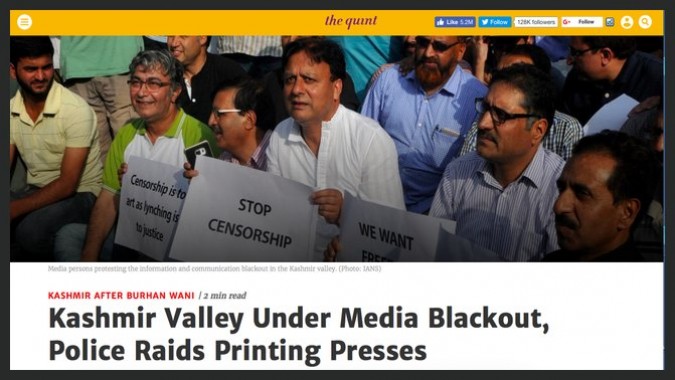Local media gagged, national news channels promoted
The government of Jammu and Kashmir has barred media houses in Kashmir Valley from printing or distributing newspapers in view of the on going uprising against the killing of popular rebel commander Burhan Wani last week. Cable television owners were also told to shutdown but later allowed to transmit except for Pakistani channels and Times Now. The decision was unofficially imposed on Saturday when at midnight police raided printing press offices of all newspapers to seize copies of printed papers. Several employees of the newspapers were also detained.
For last eight days, strict curfew has been clamped in the Valley as the number of civilians killed by troops has reached 44. More than 3000 people have received injuries and 150 have injuries in eyes due to metal pellets fired by the paramilitary forces. Protests and stone-throwing clashes have continued since Wani’s killing in a brief “gunfight” on July 8. For over a week now, mobile phone and Internet services have been shutdown. Kashmir Valley continues to remain out of touch from rest of the world.
It is not first time that media has been gagged in Kashmir, as the memories of 2010 mass uprising are still unforgettable, in which 120 civilians were shot dead by the forces. The then chief minister Omar Abdullah remarked that the current chief minister Mehbooba Mufti has repeated the mistakes he committed during his tenure. “I learnt from my mistakes, ensured they weren’t repeated again. @MehboobaMufti has not only repeated them but multiplied them many times,” Abdullah tweeted.
The Greater Kashmir newspaper reported that on Saturday midnight police raided their corporate office and arrested the Greater Kashmir Printing Press foreman Biju Chaudary and two other employees. It read: “More than 20 policemen barged into GK printing Press and directed the employees to stop printing the newspaper. The policemen seized the plates of Greater Kashmir and more than 50,000 printed copies of Kashmir Uzma and closed down the GKC printing press.”
In an emergency meeting, the Kashmir-based Newspaper Editors/Owners condemned the police raids on all the printing presses and the action of the government which resulted in breakdown of circulation of newspapers. They called it as “an attack on the freedom of press and vowed to fight it back at all costs.”
A government spokesperson was contacted during the meeting, who said, “In view of apprehensions of serious trouble in Kashmir valley in next three days aimed at subverting peace strict curfew will be imposed and movement of newspaper staff and distribution of newspapers will not be possible.”
It was decided not to publish the newspapers in view of this government direction. Later journalists from electronic, print and online media gathered for a sit-in protest at Srinagar’s Press Colony against the undeclared emergency gag. The placards, waved by journalists, read, “We want freedom of speech,” “Hypocrites get offended by the truth,” “End Communication Curfew” and “Stop Censorship.”
At the protest, Editor of Rising Kashmir newspaper, Shujaat Bukhari, said, "It is not the first time that media has been targeted in the Valley but this time they have made it official. We have been asked to suspend the work for the next few days. This is censorship.”
While the local media has been gagged, the national media is given free hand to create ruckus from the newsrooms. Shah Faesal, the first IAS topper from Kashmir, slammed such national news channels. Currently posted as director of school education, Faesal called the national media’s reporting as “sadistic propaganda machine” in which he was compared with Burhan Wani. Local journalists reporting from ground have had to face angry protestors due to jingoistic coverage by national news channels. At SMHS hospital in Srinagar an injured youth, who was hit by metal pellets in eyes, complained that journalists call all Kashmiris terrorists, thus he will not speak to anyone.
Gaurav Sawant, a journalist from India Today news channel, was seen in a paramilitary forces’ vehicle in last few days and being given secure passes to cover the on going uprising. During September 2014 floods also NDTV’s Barkha Dutt was sailing in an army boat to report the floods. It has been a routine of New Delhi based media organisations to parachute down journalists to Kashmir at a time of such crisis, showing disbelief for their local correspondents. At Times Now’s Mumbai studio, Arnab Goswami continues to hold the court hearings on Kashmir issue with his regular panellists Marouf Raza and Gen. G. D. Bakshi.
Even though the opposition National Conference said that it “strongly condemns the unprecedented assault and suppression of media in Kashmir by the Mehbooba Govt” but ironically the party had also gagged media during its tenure in government in 2010 mass uprising. People in Kashmir believe that the regional government is always powerless and all decisions are taken by the central government. With the chief minister Mehbooba Mufti failing to stop killings by the forces and listen to people, situation in the Valley has been called an era of emergency.
Fahad Shah is an independent journalist, who frequently writes for Foreign Affairs, Al Jazeera, The Diplomat, The Christian Science Monitor, Scroll.in, and Hindustan Times. He is the Editor of the anthology Of Occupation and Resistance: Writings from Kashmir (2013) and also founding editor of The Kashmir Walla magazine. He can be followed at @pzfahad.
